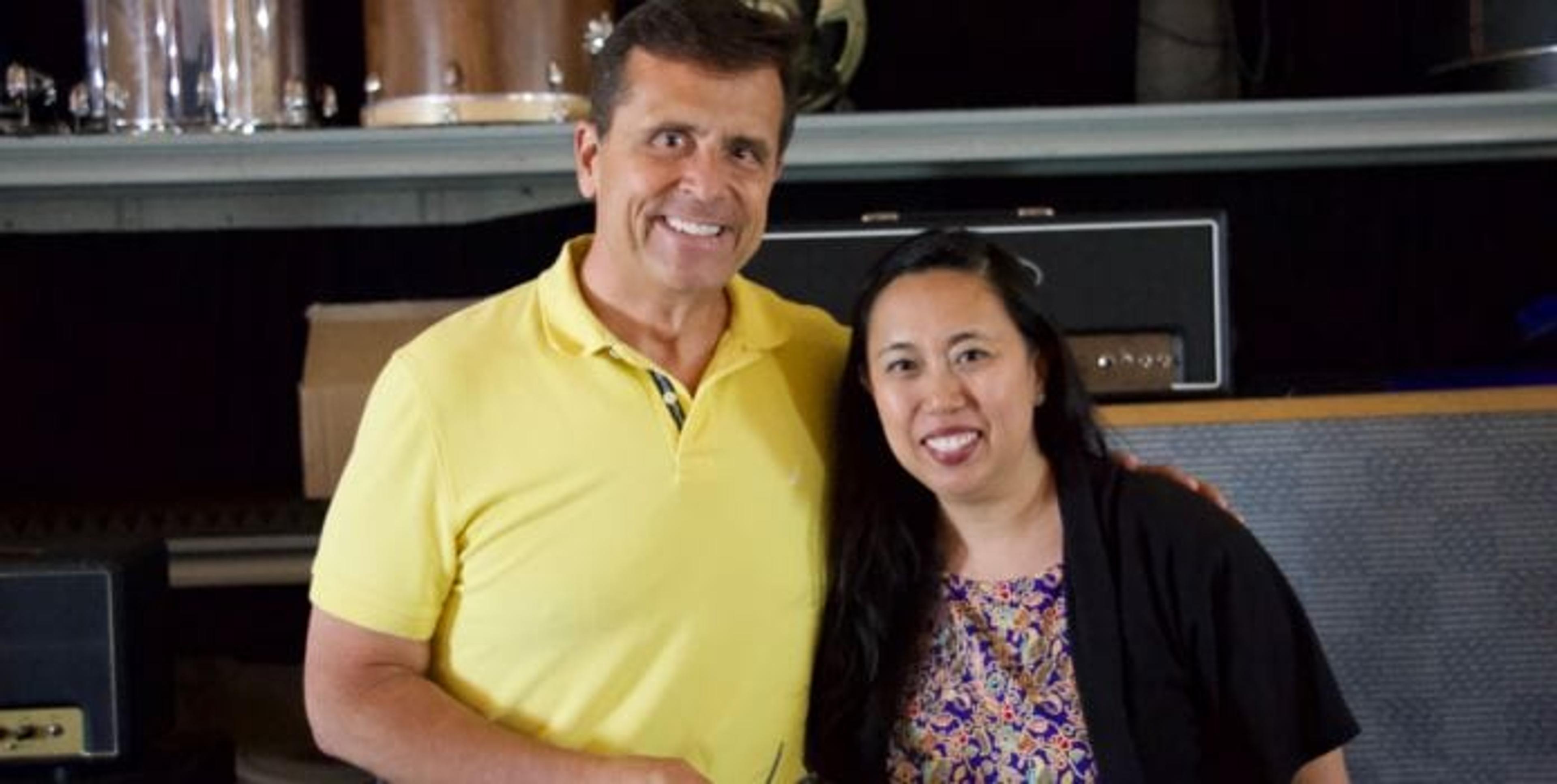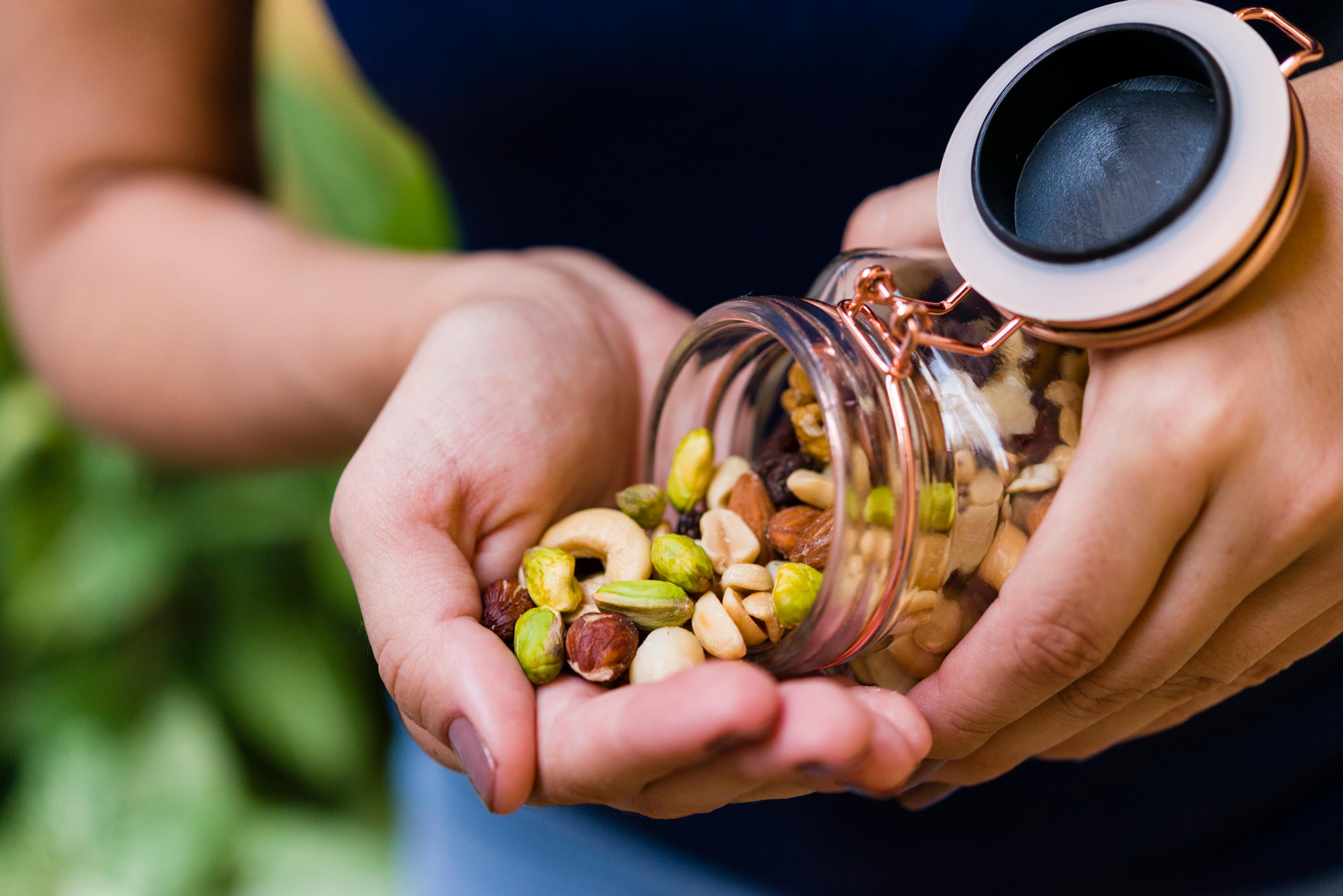How to Have a Healthy Relationship with Food
| 1 min read

00:00
00:00
About the Show
To kick off our A Healthier Michigan Podcast series, our host Chuck Gaidica sat down with certified health coach and dietitian Grace Derocha from Blue Cross Blue Shield of Michigan to talk about having a healthy relationship with food. Derocha offered some tips and tricks on how to begin having a healthy relationship with food, showing us a quick and easy meditation/breathing exercise. She then discussed the first question you should ask yourself when you want to eat: Am I hungry? (2:51)
Derocha and Gaidica then dove a little deeper talking about how to properly fuel your body for the day to improve your overall well-being. They mentioned that there is evidence that we eat too much, too often (7:57) and that the people who skip breakfast usually eat later into the night. “Food is a lot of things, more than just fuel, you know. Food is traditions, food is culture, food is your grandma’s favorite dish, food is and can be emotional and spiritual,” (3:31) says Derocha.
Derocha then touched on the importance of making sure the food we eat is both filling and satisfying, demonstrating the difference between the two. (11:24) Some other tips Derocha offered for keeping yourself full and satisfied are to make sure you’re drinking water, keeping indulgent foods out of the house and having a treat to satisfy yourself, but having something more substantial to fill you up. (12:14)
Finally, Derocha reminded us to be present and mindful while eating, saying “You can build healthier habits, day in and day out, with exercise, with good nutrition and focusing on maybe having good things in your diet, as opposed to thinking you have to cut something out.” (16:32)
Transcript
Chuck: This is A Healthier Michigan Podcast episode one. Coming up, we discuss how to have a healthy relationship with food.
Welcome to A Healthier Michigan Podcast. Oh episode 1, we’re so excited you’re with us. This podcast is going to be dedicated to navigating how we can all improve our health and well-being through small, healthy habits.
We can start implementing today. You can start it. And having a healthy relationship with food. Yes, I have been in love with a cheeseburger in my past. Maybe in my future too. I’m Chuck Gaidica, we’re so glad you’re here.
Each week, we sit down with a certified health expert from Blue Cross Blue Shield of Michigan, and we do a deep dive into topics covering nutrition, well-being, stress reduction, and on this episode, we’ve got to get some information on Grace Derocha.
Grace and I go back minutes. Our families knew each other, my son, you know, your brother, right? And then you knew of the kids. Grace is a registered dietitian, certified diabetes and certified health coach at Blue Cross Blue Shield of Michigan.
She’s a featured blogger here at A Healthier Michigan and she’s an MSU grad. She’s got more designations than certificates – I don’t know how you would put all the letters behind her name, and she’s got two kids: six-year-old daughter, three and half year-old son, and a husband.
Grace: Yeah, him too. Yay.
Chuck: How are you?
Grace: Doing well, thank you!
Chuck: It’s good to see you again.
Grace: I know I’m happy to see you. This is going to be fun.
Chuck: It is going to be fun because you’re such an expert. I mean you, you’ve got the workout piece, the diabetes certification, you, you’re a nutrition.. you know, a dietitian, right?
Grace: Yes, yes.
Chuck: Then you’ve got the whole workout thing. This is like one stop shopping. We’ve got other experts coming up in the next 18 episodes.
Grace: Yes.
Chuck: But this is all about a healthier relationship with food. What does that mean?
Grace: You know, I feel like people nowadays are looking at dieting and ways to cut back. But then they, they live in fear almost of food. They don’t have a good relationship with it. They think to themselves, “I’m being bad” or, “I’m not doing this right,” but it doesn’t have to be that way.
Chuck: But wait a minute. Aren’t there times where, let’s be fair, because in my life as a bit of an emotional eater. There’s been a binge or two on, you know, I’m watching the, you know, national news and I tell you if I watch too much of that, I’m eating six Oreo cookies and then doing two percent milk because I think I’m doing a favor- right! – for myself. But there are some things that are not great habits. Maybe we don’t want to use the word “bad”.
Grace: Right, exactly. And I think I what I want people to take out of this and our conversation today is that there are ways to bounce back and then even before that there’s ways to do better on a consistent basis without feeling deprived.
Chuck: Yeah, yeah. So where do we start with that idea, then? Does it really start at breakfast?
Grace: And I think it starts with: are you hungry? Because you said, sometimes I stress eat, and I think everyone will eat for different reasons.
Chuck: Right.
Grace: But I think, yeah, as far as timing, we start with breakfast, but then we also think about: how hungry am I throughout the day? And assessing that.
Chuck: That’s the weirdest question, you know, I mean it’s so basic, Grace, but it’s such a strange question to think you would ask yourself. Am I hungry? Because sometimes the answer truly is no and you’re still going for chips.
Grace: Exactly. And that’s what can be something that plays into our mindset, or plays into habits that aren’t the healthiest, or plays into our emotions, and I’m not saying that food is only fuel because food is a lot of things more than just fuel, you know. Food is traditions, food is culture, food is your grandma’s favorite dish, food is and can be emotional and spiritual.
Chuck: They created whole TV networks, right?
Grace: Exactly.
Chuck: And magazines of food!
Grace: Food is art. Yeah.
Chuck: It’s pretty.
Grace: Yeah absolutely.
Chuck: Well it can be yeah, yeah. Yeah, so tell us about where we begin getting in at least a healthy relationship, right? So am I hungry? is a good question and I’m saying the timing is breakfast, but it really is a mindset issue before you even wake up.
Grace: Yes. Absolutely. So, I would think there’s timing throughout the day with breakfast lunch dinner or what you think it should be but then everyone it’s going to be case-by-case. Everyone’s day runs differently: some people like to work out in the morning, some people want to work out after work, some people try to squeeze it in before lunch. So also looking at your day and what it entails to see when you might need some extra fuel – what that timing looks like, what kind of good nutrition you might be missing so that you can get it in.
Chuck: So, is the balance of how you fuel up – is that important? Because we hear so much about protein and carbs and the low-carb, the low-fat. The low this, the low, you know, don’t eat this, but popcorn at theaters, oh my gosh, if you just have a little bit it’s okay.
Grace: I know. I feel like everything is getting demonized or don’t do don’t do don’t do and we’re definitely going to talk about all of those different food groups and macronutrients, I think in a later episode, and diets as well. Yeah, but I would definitely start with am I hungry? And, we’re going to do this right now, and you guys can do it with us.
Chuck: Okay.
Grace: It’s a really quick breathing exercise and it’s a way to be present and mindful before you go and grab something. So you can close your eyes and you take three deep breaths in. And out. Let’s do two more. In and out. Last one. In and out. It just that was relaxing.
Chuck: It was.
Grace: And then assess – right now, in this present moment – your hunger level. So, one would be I’m not hungry at all and 10 would be I’m starving. And then you pick your number. What are you? Where are you at right now?
Chuck: Right now? Well, I already told you off mic, you know, it’s an apple and peanut butter and a cup of coffee this morning. I’m still feeling good because sometimes my stomach will start to grumble. I feel like I’d say, I’m at eight/nine.
Chuck: Right now? Well, I already told you off mic, you know, it’s an apple and peanut butter and a cup of coffee this morning. I’m still feeling good because sometimes my stomach will start to grumble. I feel like I’d say, I’m at eight/nine.
Grace: Okay. Yeah, perfect. So, if you had to pick something, what would you pick to eat right now?
Chuck: Oh, probably another apple because it’s out on the table. You know, I don’t really go for the processed snacks. And I like nuts, but if there were pistachios, maybe I’d have that or something that doesn’t have a lot of salt maybe would be my choice, but fruit would be the number one hit.
Grace: I love that because fruit is good because it gives you a good burst of energy, has lots of good nutrition and I love that you’re thoughtful about your process of the things that you like and what you know is available to you. Right. And so, I think that’s what people have to think about, too, so that structure of your home and what you have available to you becomes key.
Chuck: So, is your daily routine – a lot of people are listening right now, right, and they’re on the go all the time, maybe they’re walking while they’re listening to this – but you know it, you wake up, maybe there are people who skip breakfast. Yes, and they still seem to do okay, or somebody who says I’m way too busy to get lunch today. Would you encourage them that they need to adjust habits or if that’s their thing, that’s just their thing?
Grace: So, it depends on the person and you know, if they have any chronic conditions or health concerns, I do like to see people eat regularly because I want them to build a metabolism that’s going to work best for their body.
Chuck: So, if you’re skipping breakfast, that affects your metabolism through the day?
Grace: It can.
Chuck: Interesting.
Grace: So, because, you know why breakfast is called breakfast? Because it breaks the fast from your sleep to kick start your metabolism.
Chuck: Well, that’s where this whole idea of intermittent fasting is coming from, right? So you break your fast, but they’re saying like back in caveman days/cavewoman days, we would have gone maybe three days and then you break your fast. I still see that and I think – I don’t know who’s doing this fasting thing, but I can’t get past overnight.
Grace: I know. And I’ve read lots of studies on it and I think, again, I think it’s case by case because someone who’s diabetic and needs to have fuel their bodies so if they’re on medication don’t have a low blood sugar have an issue, but there is some evidence that we do eat too much, too often and that you do need to give your stomach, your body and your brain a break, you know, if people are having that fourth meal late at night, they could get into trouble because then they think they have to eat right away in the morning and may not have to, or maybe they didn’t need the fourth meal. You know what I mean?
Chuck: Well, and if you’re skipping early, isn’t there a chance that that body fuel connection that your brain or your body physically is signaling, I need more, I need more so your dinner tends to overcompensate because you came home starving.
Grace: Right and we there’s research that shows people that skip breakfast usually eat later into the night, so it’s almost like you’re adjusting that. And I think, again, with intermittent fasting- because there’s rules -people are following it, but maybe they’re not listening to the body and I think that’s such an important part of this, like we did the deep breathing, being mindful about what you would choose, being mindful and present when you’re eating so you don’t overeat. Actually, as you’re going through the digestion process, there’s three chemicals that tell – from the stomach to the brain – that say I’m full.
So that’s why you know, we want to pace ourselves and take our time and eat slowly. And enjoy the food that we want. So, we don’t have to be perfect all the time, whatever that means.
Chuck: Well, and you know, you say there are bad ways to look at food and bad words. I mean, the word diet itself has been morphing overtime to lifestyle change.
I have to admit to you, my entire life, I’ve had a struggle. I mean I’ve been on two diets at once because I don’t get enough food with one. I mean, you know, and so I I’ve tried to figure out, is this the week I’m high-protein? Is this the week I’m low carb? Is this the week I’m high-fat because my buddy told me he’s on a beer and bacon diet.
I’m like, really just beer and bacon works? Well, for certain people that may work for a minute, but juggling all these thoughts that are coming at us through the media, really. Some of those diets are good and some of them are not as balanced to give you the fuel you’re saying we need.
Grace: I have so many issues with the word diet itself and what that means.
Chuck: So, should I not use that word?
Grace: So before, I felt like diet meant something else, and now diet has a connotation of something that has a beginning and an end and I know we’re going to talk a lot about diets coming up for sure, but, people think that they’re it is something that they do and happens, you know to them.
Chuck: I started on Monday and I’ll be done in 60 days and everything will be okay. And it’s not that.
Grace: And you know what, I’ve had people tell me it was easier to quit smoking than to figure out how to eat right, because smoking I could just stop and we don’t stop eating or drinking right? I thought that was really impactful to hear.
Chuck: So, anything else related to this notion of fuel for our bodies? Because that’s an easy thing to relate to, that we need fuel. Anything else? Because you can have you know, premium fuel you can have unleaded, you know.
Grace: Right. So, what I would say to people too is if we were a car. Most of the time if your gas tank is a quarter empty, you don’t usually stop to get gas again, even if it’s half empty, you might not. But if you know you’re going on a long car ride like going on a workout or having a busy day, you might fill up because you know, you’re going to need that fuel.
Chuck: Yeah.
Grace: And so, if we think of our bodies in a sense in that way, you know, assessing when we’re hungry, assessing what might fill us AND satisfy us, because I think we can have filling food that might be lower in calories or have empty calories but might not satisfy you.
Chuck: Well, you’re talking about the half sleeve of Girl Scout cookies that you know, because you know, there are certain things with this notion of calorie density. When I look at the apple, and how much of that’s solid, I look at and I think, well that’s going to fill up the space in my gut. But yet only one little cookie is still got the same 75 or 80 calories, you know, it’s not working for me.
Grace: So, filling versus being satisfied. Or, could you maybe have one cookie if you really really want the taste.
Chuck: One cookie? What country is? What where are you from? What?!
Grace: And having the Apple too.
Chuck: Yeah, is are there any other tricks because you know, I hear people say – my wife does this to be fair – Susan will feel hungry and she will go get a glass of water.
Grace: You’re like reading my mind.
Chuck: Oh, I didn’t know, sorry.
Grace: Yes, so even when you’re assessing your hunger level, many times when we are thirsty or dehydrated, we feel hunger.
Chuck: So she is as smart as I thought! Because you know, she’ll do stuff like this and I’ll say I don’t know if a glass of water would do it and I think for her, to be fair, it’s also part mindfulness.
Grace: Yes.
Chuck: She’s taking the one…two…three break while she’s drinking water and getting filled and she said, you know when I walk away, most of the time I don’t need that thing I thought I had to go grab.
Grace: Right and it does also give you a second to think, “didn’t I just eat breakfast recently? I don’t really need anything right now.”
Chuck: Interesting.
Grace: It might be a habit.
Chuck: Man, I married up. You know, it’s just so good to have somebody smart in the house.
Grace: She is smart, for sure.
Chuck: All the kids took after her too, all right.
Grace: I don’t believe that, I know you’re smart!
Chuck: Do we also look at this idea of through the day as being something we can manage in increments? You know, you’re talking about the time periods, because when you try to wrap your arms around, you know – that’s kind of a bad analogy – if you’re looking at trying to lose weight, you’re wrapping your arms around yourself, having small goals, even through the day is good, right?
Grace: We’re definitely going to talk about goal setting too but yeah, having small goals throughout your day and taking time to plan a little bit. Again, I feel like my husband Tom- I’m calling you out buddy- but he loves ice cream.
Yeah, so we don’t keep ice cream in the house. And I’m a chip girl. I’m more of like the savory end. So, if there’s chips or something salty, that’s what I would gravitate towards. So, we don’t – even though we have young kids – we have some things, but we don’t have ice cream because we walk to the frozen yogurt place. That’s our that’s like our treat.
Chuck: So, you’re getting some steps in?
Grace: We’re trying to get our steps in.
Chuck: And can I just say, for unnamed person, Tom, that if you’re out driving, that place with the golden arches – under 200 calories, three and a half grams of fat for their frozen yogurt just, it’s a buck and a quarter cone.. I’m just saying grace. Men need to stick together here.
Grace: I know, and that’s okay. But I think part of that is building the structure of your home to support whatever some of your health goals are and I think if you are parents, your kids are watching. They want they want to be like you.
Chuck: Speaking of that, because don’t you have some kind of drawer or place? Even if it’s healthy snacks? You’ve got two kids.
Grace: Yes. Definitely. I have little containers and they’re labeled. So, some have dried fruits, some have nuts, some have- it’s called treats. Yeah, so, you know and I mean I never tried to deprive them of anything, but you’ll hear my daughter – and she’s six – she’ll say, “you didn’t pack,” (during the school year) “you didn’t pack any vegetables in my lunch today.”
Chuck: Good job, Mom. I mean really- all the degrees are paying off. Yeah!
Grace: But it’s really interesting and even last night, she’s like, “I have vegetables but can I have fruit too?” And I was like, do you want to do the podcast for me honey?
Chuck: Come on.
Grace: No, she does! She calls me out often.
Chuck: Yeah, so as a parent though, we’ve got maybe a lot of people who are listening who are parents, eating crust of the grilled cheese that’s left- or something. I mean, you’ve got to manage your way through life, being a parent so you’re not overeating because they left stuff on their plate.
Grace: Right, try to use some whole-grain bread, as long as you don’t have celiac disease.
Chuck: Yeah, right. So, anything else as we talk about this idea of fueling up your body, or food is more than just fuel?
Grace: I would remind people that the strength of their body- so, you know, we used to look- I used to look- at eating and exercise as being young and being aesthetically pleasing but now focusing on the health of that because we can have health at every shape. You don’t have to be perfectly skinny. Yeah, you know, you do have to keep improving upon it to live that healthy lifestyle. I don’t know what perfectly skinny even means. Do you know what that means?
Chuck: I’m not sure what that is either. Yeah, but I don’t think anybody does, right? Unless you’re some supermodel and that’s just been what you work at your entire life. Right. Who is?
Grace: Yeah. And I think reminding yourself to empower yourself with that knowledge to be mindful that you do have control over what you eat.
You can build healthier habits, day in and day out, with exercise, with good nutrition and focusing on maybe having good things in your diet, as opposed to thinking you have to cut something out.
You can build healthier habits, day in and day out, with exercise, with good nutrition and focusing on maybe having good things in your diet, as opposed to thinking you have to cut something out.
Chuck: I think that’s really good, sane advice because too many times we work ourselves up into this frenzy. I like the idea of mindfulness – like the breathing exercise – and I know it’s a podcast but come on, we can all do that. Yeah, we can practice it. We can rewind this episode – episode one, by the way – and we can go back and we can do those things and instill those little habits through the day.
Grace: And being present when you’re eating, because often we’re eating in front of the TV, so you’re not mindful, we’re eating in the car. Yeah, and you know that’s sitting down at dinner and having family time allows you to be present and allows you to communicate with the family. Getting the whole family involved in that process.
Chuck: Can I just say – I don’t want to get on a soapbox for my entire professional career, as long as something didn’t derail me professionally, meaning there was a storm or something – every night, we sat down for dinner.
Grace: I love that.
Chuck: And the stuff you hear that you pick up from the kids’ lives is critical. Of course, we didn’t have as many smart devices but it’s huge.
Grace: It is huge.
Chuck: Yeah. And they could call me out and say, “Dad you already had the mashed potatoes and gravy!” Okay, stop it kids.
Well, I can’t wait for episode two. We’re talking about micro and macro nutrients?
Grace: Yes, we’re going to get kind of into the more the nitty-gritty of the food.
Chuck: More scientific? Okay, that’s cool stuff. Well, listen, we appreciate you listening. This is a brand-new podcast series. This is episode 1. It’s called A Healthier Michigan Podcast brought to you by Blue Cross Blue Shield of Michigan. If you like the show, you want to know more, here comes the web domain: ahealthiermichigan.org/podcast.
There will eventually be 18 episodes for you to check out so you can jump ahead and you can check them all out if you want, but we’ll be getting the episode two the next time and you can leave us a review, right on iTunes or Stitcher.
You can get all the new episodes on your smartphone or tablet. Be sure to subscribe to us on Apple Podcast, Stitcher or your favorite podcast app.
Join me next time with Grace Derocha. She’ll be coming back and again talking about macro and micronutrients: how we get a healthier balance from both of those food groups, and just what do those words mean? Anyway, I’m Chuck Gaidica. See you next time.





